Researcher Spotlights

Bernarda Calla
Bernarda is a Post Doctoral Research Associate at the Department of Entomology / School of Integrative Biology at the laboratory of May Berenbaum. She uses next-generation sequencing and bioinformatics to understand the evolution of herbivory, detoxification mechanisms, and the effects of natural and human-made toxins in insect genomes
What do you see as the primary benefit to you of archiving your data in a repository?
I have used other data repositories in the past. The Illinois Data Bank was a whole different experience. The data specialist at the repository helped me best shape my data to be usable by other scientist, none of the other services I used was so through and meticulous with the whole submission process. I am glad we have this service available.

Nick Abboud
Nick is a PhD student in the Department of Physics. His research aims to uncover and better understand quantum-mechanical effects in the large-scale collective motion of many-body systems driven far from thermal equilibrium. His work finds applications in diverse physical settings across widely separated scales, from tiny droplets of quark-gluon plasma produced in collisions between atomic nuclei to electron gases in tabletop quantum materials.
What do you see as the primary benefit to you of archiving your data in a repository?
Numerical codes play an essential role in interpreting experimental data. By making my code publicly accessible, I establish a transparent reference for methods and results that cannot be fully captured in a traditional publication format. This allows others to examine the numerical implementation directly and reproduce the results, ultimately strengthening the work and facilitating extensions in related settings. Publishing in the Illinois Data Bank also ensures that this material remains available over the long term without requiring me to personally maintain a separate repository.

Ryan Corey
Ryan is a PhD student with Professor Andy Singer in the department of Electrical and Computer Engineering. His research is on array signal processing and audio signal processing with a particular emphasis on augmented listening technologies such as hearing aids. He is developing wearable arrays with dozens of microphones to improve listening in noisy environments.
What influenced your decision to deposit your data in the Illinois Data Bank?
Open-access datasets are important resources in my field. They allow researchers to test new algorithms on real-world data that would otherwise be difficult and time-consuming to collect. A common data set can also provide a fair basis for comparison between different algorithms. Unfortunately, these datasets are often difficult to access and may disappear entirely if their creators fail to maintain them. By publishing my dataset in the Illinois Data Bank, I can ensure that it remains accessible to the research community for many years.

Loren Merrill
I am a postdoctoral researcher at the Illinois Natural History Survey working with T.J. Benson (Avian Ecologist, INHS) examining the influence of different land-cover types on the health and condition of shrubland birds. Prior to joining INHS, I did a one year postdoc with Jennifer Grindstaff at Oklahoma State University examining the impacts of early-life stressors on short and long-term trait expression in zebra finches. I conducted my PhD at the University of California, Santa Barbara on life-history strategies and ecophysiology of blackbirds. I am an avid birder and nature photographer and am happiest when immersed in wild places.
What influenced your decision to deposit your data in the Illinois Data Bank?
By making data available to other researchers through the Illinois Data Bank we increase the potential impact of our work. Other researchers can use these data as part of reviews or syntheses, which allows the work we did to become part of a larger study, and may garner additional interest in our project. Moreover, depositing the data provides a safeguard against loss of the original data, and preserves it for future uses.

Sara Benson
Sara is a lawyer with ten years of experience teaching at at the University of Illinois College of Law. Prior to joining the College of Law, she worked both in a large international law firm and a small boutique non-profit law firm. Currently, Sara is the Copyright Librarian at the University Library at Urbana-Champaign. The ultimate goal of her research agenda is to shape the future of copyright policy by examining both on-the-ground practice in libraries and museums and the socio-political guiding principles behind such practices.
What do you see as the primary benefit to you of archiving your data in a repository? What influenced your decision to deposit your data in the Illinois Data Bank?
The primary benefit to me is to keep my data protected in a safe place so that I can access it in the future should I wish to build on that research.
I deposited my data in the Illinois Data Bank so that I can link the data to my research article and make it easily accessible to other researchers in the field. Sharing data in the Illinois Data Bank is easy and helpful both to the researcher and to other colleagues in the field. I highly recommend others to share their data, too!
I deposited my data in the Illinois Data Bank so that I can link the data to my research article and make it easily accessible to other researchers in the field. Sharing data in the Illinois Data Bank is easy and helpful both to the researcher and to other colleagues in the field. I highly recommend others to share their data, too!

Qian Zhang
Qian Zhang is a joint postdoc across the iSchool, NCSA and RDS. She is also a computational scientist and oceanographer in Physical Oceanography. Her multidisciplinary research covers quantitative data analysis and visualization, high performance computing (HPC), numerical/mathematical modeling and simulations of atmosphere-ocean dynamics, and computational fluid dynamics (CFD). Qian published the data from her PhD dissertation about the computational study of hydrodynamics in the Wax Lake Delta
What influenced your decision to deposit your data in the Illinois Data Bank?
The data from my PhD thesis represents 4 years of research work, the whole package of which bundles not only large datasets but also the numerical model and codes for data analysis and visualization. I'm happy to find such a reliable place to house my research data so that my efforts to create, document, and organize those data won't be lost, and that others can build off of all the work I’ve already done. I really hope that the Data Bank keeps growing so that more researchers become aware of the service, and that more datasets produced by Illinois researchers are to be explored, re-used and to inspire new discovery.

George Chacko
George Chacko is Research Associate Professor in the Siebel School of Computing and Data Science and Executive Director of Research Analytics at the Grainger College of Engineering. His research interests span scalable clustering methods, novelty in science, research impact, knowledge diffusion, historiography, and the structure and formation of research communities. His research is supported by by awards from the National Science Foundation and the Illinois:Insper Partnership. His work has also been supported by cloud computing awards from Oracle and Google. Another source of computing is the Illinois Computes program.
What do you see as the primary benefit to you of archiving your data in a repository? Is there anything else you would like to share?
Apart from usefully archiving the data for my own use, it makes our data available to others, and enables them to reproduce and extend our work. The process of archiving our own data also helps us to be diligent about creating adequate documentation surrounding it.
The Data Bank is easy to use. The staff are informed and very helpful. The university is fortunate to have such a resource available to its staff and faculty; unencumbered by bureaucratic process or fees.
The Data Bank is easy to use. The staff are informed and very helpful. The university is fortunate to have such a resource available to its staff and faculty; unencumbered by bureaucratic process or fees.

Chris Wiley
Chris received his MSLS from Florida State University with a concentration in Information Architecture. Before joining the University Library, he was a librarian at NOAA Miami Regional Library. Chris joined the University Library in 2013 and is the Engineering and Physical Sciences Research Data Services Librarian. His research focuses on data management practices, the implementation of data services programs, and uses of institutional repositories.
What do you see as the primary benefit to you of archiving your data in a repository?
The primary benefit of archiving my data in the repository is that it allows me to share it with other interested researchers and increase visibility. There are a lot of perspectives on usage statistics in campus repositories. Sharing the work allows for the conversations to continue and provides opportunities for new ideas, improvement, and innovation.

Introducing CABBI Datasets
Leslie Stoecker serves as the Data Manager for the Center for Advanced Bioenergy and Bioproducts Innovation (CABBI), a U.S. Department of Energy funded initiative, focused on developing sustainable bioenergy solutions. In her role, Leslie deposits datasets on behalf of CABBI researchers. Here, we feature her testimonial about using the Illinois Data Bank.
What do you see as the primary benefit to you of archiving your data in a repository? What influenced your decision to deposit your data in the Illinois Data Bank? Is there anything else you would like to share about the Research Data Service, Illinois Data Bank, or your research?
The Illinois Data Bank offers many benefits to CABBI! One of the best is that we can easily meet our funder's data availability requirements by making datasets available with a DOI. After students or postdocs finish their time with CABBI, their data are still easily findable and accessible to share with collaborators both within and outside the Center.
For many of the datasets that CABBI produces, there are not subject-specific repositories to submit the data to, so we use the Illinois Data Bank because it is easy to use and access. Also, the wonderful curators perform thorough reviews of our datasets to ensure they are well-documented and formatted for long-term storage and use in the absence of accepted standards for these types of datasets.
The RDS and the Data Bank have made it easy to make our data available long-term. Both are wonderful resources on campus that help researchers create the best datasets possible and to help science advance.
For many of the datasets that CABBI produces, there are not subject-specific repositories to submit the data to, so we use the Illinois Data Bank because it is easy to use and access. Also, the wonderful curators perform thorough reviews of our datasets to ensure they are well-documented and formatted for long-term storage and use in the absence of accepted standards for these types of datasets.
The RDS and the Data Bank have made it easy to make our data available long-term. Both are wonderful resources on campus that help researchers create the best datasets possible and to help science advance.

Yijing Huang
Yijing earned her B.S. in Physics from Tsinghua University in 2016 and completed her Ph.D. in Applied Physics at Stanford University in 2022. Her research focuses on light–matter interaction, with particular emphasis on ultrafast X-ray scattering, terahertz spectroscopy, and nonequilibrium states of matter. Her doctoral work was recognized with the 2022 LCLS (Linac Coherent Light Source) Young Investigator Award, and her thesis, Towards the Optical Control of Resonantly Bonded Materials, received the Springer Thesis Award and was published in the Springer Theses series in 2023. She was also selected as a finalist for the Carl E. Anderson Division of Laser Science Dissertation Award. Dr. Huang was an IQUIST (Illinois Quantum Information Science and Technology) Postdoctoral Fellow in the Department of Physics at the University of Illinois Urbana-Champaign.
What do you see as the primary benefit to you of archiving your data in a repository? What influenced your decision to deposit your data in the Illinois Data Bank? Is there anything else you would like to share about the Research Data Service, Illinois Data Bank, or your research?
For me, archiving data preserves the most fundamental principles of experimental science: reproducibility and openness to re-examination. Scientific interpretations evolve over time, but the data itself should remain accessible and stand on its own. A well-maintained data repository provides a durable foundation for experimental research by enabling others to verify, revisit, and build upon prior work. In an era of rapidly expanding scientific output, trusted data repositories play an essential role in maintaining the long-term health and integrity of the research community.
During the manuscript preparation process, I became increasingly aware of how central reproducibility is to meaningful scientific progress. A peer-reviewed journal article, by necessity, can only include a limited subset of experimental details, and many aspects of the workflow—especially those not directly queried during peer review—are often omitted. Depositing data in the Illinois Data Bank allowed me to provide a more complete and transparent record of the research process, including experimental details that are important for replication but difficult to fully document within a traditional publication. This level of openness supports more robust verification and reuse of results beyond what is typically possible in a journal article alone.
The Illinois Data Bank is an excellent resource for researchers at the University of Illinois, and the Research Data Service staff were exceptionally helpful throughout the data publication process. Their guidance made it much easier to address practical and conceptual questions related to data sharing, documentation, and long-term accessibility. I am genuinely grateful for the support provided by the platform and see it as an important component of responsible and transparent scientific research.
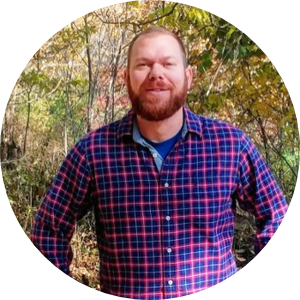
Sam Stickley
Sam is a PhD candidate working in Jennifer Fraterrigo's landscape ecology lab in the Department of Natural Resources and Environmental Sciences. He earned his B.S. degree from Colorado State University and M.S. degree in Environmental Studies from Virginia Commonwealth University. Sam is interested in prioritizing conservation efforts, and his current research involves the use of geospatial datasets to predict microclimate for use in species distribution modeling of plethodontid salamanders in southern Appalachia.
What influenced your decision to deposit your data in the Illinois Data Bank? Is there anything else you would like to share about the Research Data Service, Illinois Data Bank or your research?
This dataset was developed as a collaborative effort from multiple people, so we were interested in storing our data in one secure place as a long-term backup and we needed to fulfill data storage requirements for publication. Illinois Data Bank was great to work with and very thoroughly checked our data to make sure we did not have any errors before submission which was appreciated.

Cory Suski
Cory Suski is a professor in Natural Resources and Environmental Science. His lab group does work related to all aspects of fisheries conservation, with topics that include the impacts of climate change on fishes, how angling can shape individual fish and fish populations, and trying to control the spread of invasive species.
What do you see as the primary benefit to you of archiving your data in a repository?
The primary benefit to me of archiving my data is to make the information available to others that might be interested, and to foster an environment of openness and transparency in research. My decision to deposit is driven mainly by my interest in facilitating future discovery in others, and trying to maximize benefits from the data that we've generated.

Megan Konar
Megan Konar is an associate professor in the Department of Civil and Environmental Engineering at the University of Illinois at Urbana-Champaign. Prof Konar's research focuses on the intersection of water, food, and trade. Her research is interdisciplinary and draws from hydrology, statistics, and economics. Her research group is passionate about creating new data that can help researchers, decision-makers, and the general public better understand their food and water systems.
What do you see as the primary benefit to you of archiving your data in a repository? Is there anything else you would like to shar
It is wonderful to have the Illinois Data Bank as a resource to archive my group's research data in support of our scientific publications. We are committed to sharing our research data and the Illinois Data Bank makes this easy!
It is also great to work with the Illinois Data Bank because they understand and work with the peer review process. They will provide a draft mode for use during peer review, but will wait to publish the data until the paper has been accepted. It is also helpful to have a DOI for the data so that other researchers can easily find and build upon it.
It is also great to work with the Illinois Data Bank because they understand and work with the peer review process. They will provide a draft mode for use during peer review, but will wait to publish the data until the paper has been accepted. It is also helpful to have a DOI for the data so that other researchers can easily find and build upon it.

Chris Dietrich
Chris Dietrich is Principal Research Scientist, Curator of Insects and Illinois State Entomologist at the Illinois Natural History Survey, Prairie Research Institute, and Graduate Faculty member in the School of Integrative Biology, College of Liberal Arts & Sciences, University of Illinois Urbana-Champaign. His research focuses on the biodiversity and evolution of leafhoppers, treehoppers and related hemipteran insects, which include many agricultural pests and vectors of plant pathogens.
What do you see as the primary benefit to you of archiving your data in a repository? What influenced your decision to deposit your data in the Illinois Data Bank?
Archiving data in a repository saves me the trouble of managing data myself over the long term. This gives me peace of mind: I don’t have to worry about losing data and always know where to find it.
On the one hand, I like being able to deposit my data and immediately get a permanent link that I can include in a manuscript; on the other, I also like the support provided by the Data Bank's data curators, including pre-publication checks of the metadata, which help improve access and interpretation by downstream users.
On the one hand, I like being able to deposit my data and immediately get a permanent link that I can include in a manuscript; on the other, I also like the support provided by the Data Bank's data curators, including pre-publication checks of the metadata, which help improve access and interpretation by downstream users.

Elena Andrea Pelech
Elena is a postdoctoral researcher at the Institute for Genomic Biology who studies the physiological plasticity of crops related to photosynthesis under dynamic and steady-state light conditions in both controlled and field environments using gas exchange techniques to improve photosynthetic efficiency and global food security.
What do you see as the primary benefit to you of archiving your data in a repository?
The Illinois Data Bank saves time, and the deposit process is easy with great support from the curators! After completing the deposit process, I almost instantly received a link to include it in my manuscript.

Spencer D. C. Keralis
Dr. Keralis is Assistant Professor and Digital Humanities Librarian. Their research crosses disciplinary boundaries to examine labor ethics and applied social justice principles in digital scholarship and librarianship. They were principal investigator for the TX-Gender Project, and the Becoming a Trans Inclusive Library Project, which explored the professional development needs of librarians to deliver inclusive services for transgender and gender creative patrons.
What influenced your decision to deposit your data in the Illinois Data Bank and what do you see as the primary benefit to you of archiving your data in a repository?
Sharing data is a critical part of my research process. Making survey data available helps others verify my results, which increases my credibility. It also allows others to use and cite my data to draw their own interpretations and to complement their own research. This is particularly important for research areas in which there isn’t a lot of data available. Archiving my data also gives me peace of mind that the data will not be lost due to equipment failures or misplacing a thumb drive. I know I can access my data in the future because it’s safe in the Illinois Data Bank.
I’m a firm believer in Open Access and Open Data, so I always make a point of making sure my data, survey instruments, and publications are in a repository. The Illinois Data Bank is a safe, sustainable, and secure place to share my data, and has a great reputation on campus and beyond. The level of collaborative service and professionalism of the Illinois Data Bank staff makes me feel confident that my data will be well cared for and available to cite, share, and reuse in the future.
I’d urge other scholars to explore ways to make their data and other research outputs open. It’s a great way to increase awareness of your work, and is much safer than ad hoc data storage, and more affordable than commercial solutions. I kind of feel like an ad for Illinois Data Bank, but I really do believe they’re among the best in the academic data repository business, and there’s nobody I’d rather trust with my data!
I’m a firm believer in Open Access and Open Data, so I always make a point of making sure my data, survey instruments, and publications are in a repository. The Illinois Data Bank is a safe, sustainable, and secure place to share my data, and has a great reputation on campus and beyond. The level of collaborative service and professionalism of the Illinois Data Bank staff makes me feel confident that my data will be well cared for and available to cite, share, and reuse in the future.
I’d urge other scholars to explore ways to make their data and other research outputs open. It’s a great way to increase awareness of your work, and is much safer than ad hoc data storage, and more affordable than commercial solutions. I kind of feel like an ad for Illinois Data Bank, but I really do believe they’re among the best in the academic data repository business, and there’s nobody I’d rather trust with my data!

Tandy Warnow
Tandy is the Founder Professor of Engineering. Her primary appointment is in Computer Science, but she is a member of many other departments and programs at the U of I. She received the National Science Foundation Young Investigator Award in 1994, the David and Lucile Packard Foundation Award in Science and Engineering in 1996, a Radcliffe Institute Fellowship in 2006, and a Guggenheim Foundation Fellowship for 2011. Her research areas are: bioinformatics and computational biology; machine learning and statistical inference; and discrete algorithms on big data.
What do you see as the primary benefit to archiving your data in a repository?
We do a huge amount of simulation and testing to understand methods and how methods work on datasets. I’ve never had to store this amount of data. Having data-sharing resources available is an unbelievably helpful and necessary thing for us in terms of transparency and the data being usable in the research community.

Yushu Xia
Yushu Xia is a Lamont Assistant Research Professor at Lamont-Doherty Earth Observatory at Columbia University. She completed her Ph.D. with Professor Michelle Wander at UIUC. Her research lab utilizes field, lab, and remote sensing datasets along with modeling tools to monitor soil health, carbon sequestration, greenhouse gas emissions, and ecosystem productivity. Her finer-scale research aims to help farmers improve precision agriculture, while her broader-scale research aims to benefit policymaking by improving the accuracy and reducing the uncertainty of estimates associated with ecosystem services.
What do you see as the primary benefit to you of archiving your data in a repository?
I have always believed in the concept of open research, and I strive to make all the datasets and modeling tools generated from my research to be publicly available. To achieve better confidence in adopting improved soil management as a natural climate solution, we need to improve the quantification of various soil ecosystem service outcomes under different climate and management scenarios using modeling tools. However, models can never be accurate enough without using on-the-ground datasets for calibration and validation. Open datasets can help alleviate the data gaps that the soil modeling community is faced with.

Michael Lotspeich-Yadao
Michael is a Research Specialist in the School of Social Work and earned his Ph.D. in Applied Sociology at Baylor University. As a rural sociologist and demographer, he is interested in how the spatial and temporal modeling of ecological conditions can explain contemporary social problems. Michael currently uses geospatial datasets to provide analytical bandwidth to Illinois agencies that reflect the diversity of our state's communities.
What influenced your decision to deposit your data in the Illinois Data Bank?
Social problems exist within space and time, and thus there are forces at play in Illinois’ communities that are not considered by aspatial theories and analysis. As an undergraduate at Illinois learning about Geographic Information Systems, I would have appreciated having a resource like this to reduce the barrier of entry for a social scientist to think about measures spatially. It just changes your cognitive framework when you can visualize things like racial stratification, population distribution, political election results… or even how all of these measures interact with one another! GIS enhance sociological research by encouraging a different way of thinking about societal challenges.

Avery Mickalide
Avery was born in Maine and received his PhD in physics from the University of Illinois in 2019. After traveling for half a year and then living at home, he moved to Silicon Valley to start a job as a computational biologist and founded the organization STEM Strikes for Peace (stemstrikesforpeace.org).
What do you see as the primary benefit to you of archiving your data in a repository?
“I poured myself, heart and soul into generating the dataset for this paper. It seems wrong for its usefulness to stop now that I graduated and a paper has been published. Depositing the dataset into the Illinois Data Bank gives me the feeling that my work in graduate school had purpose, that other scientists can pick up the torch where I left off.”
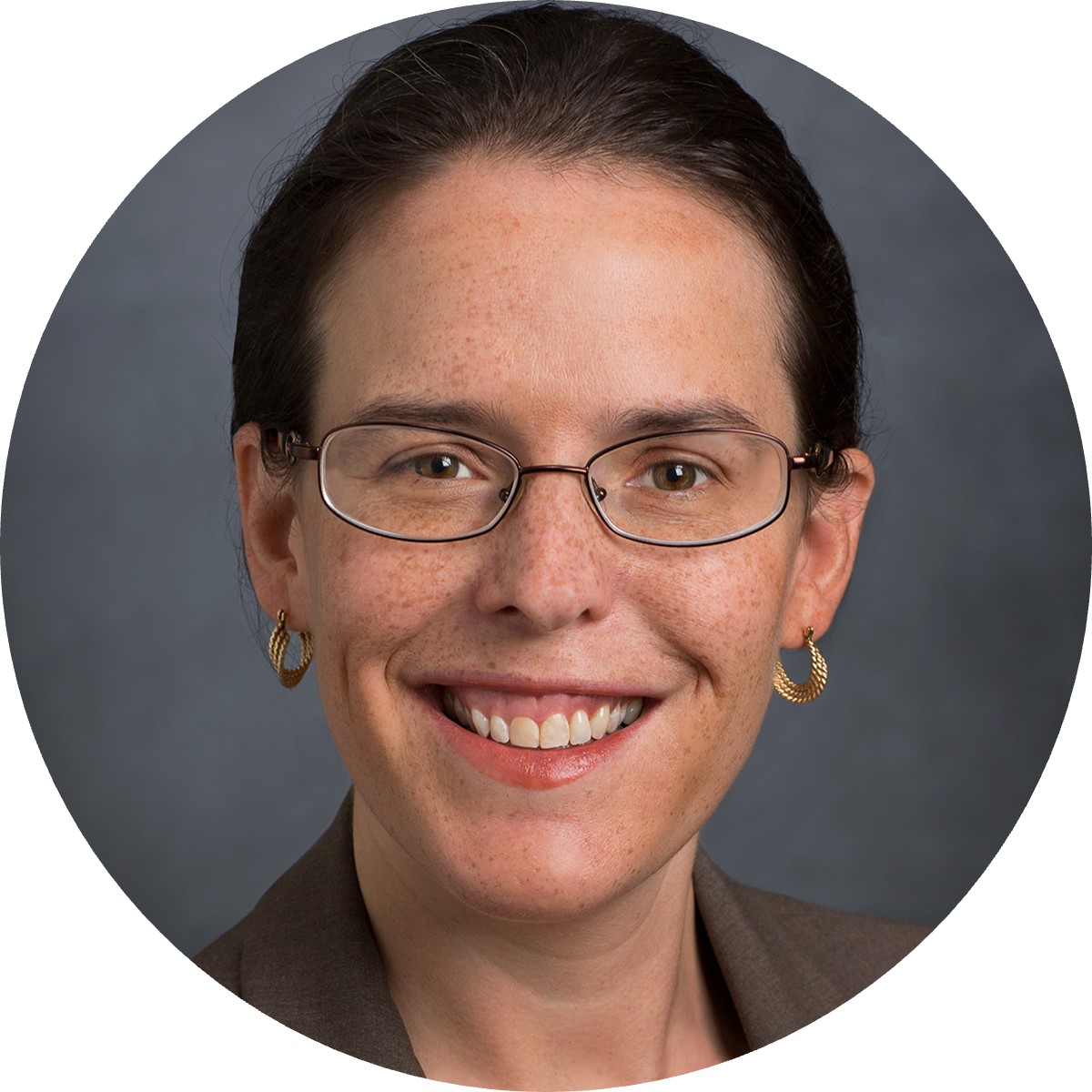
Rebecca Smith
Dr. Smith is an associate professor of epidemiology at the University of Illinois College of Veterinary Medicine, a Health Innovations Professor at the Carle-Illinois College of Medicine, and a member of the Infection Genomics for One Health theme at the Carl R. Woese Institute for Genomic Biology. Her research focuses on using mathematical and statistical modeling with complex data sets to improve disease control programs, with a special interest in One Health and infectious diseases. She has also served on the scientific leadership team for SHIELD, the COVID-19 control program at the University of Illinois Urbana-Champaign.
What do you see as the primary benefit to you of archiving your data in a repository? What influenced your decision to deposit your data in the Illinois Data Bank?
I believe in open science, and that includes making my data available. The review process – having an expert go through my data before publishing a dataset has been incredibly helpful.

Greg Spyreas
Greg Spyreas is a plant ecologist and botanist with the Illinois Natural History Survey. His research area is applied ecology that aims to bring about better conservation, restoration, management, monitoring, and understanding of natural areas and their floras/faunas, especially those of Midwestern North America. Greg published data from a longitudinal assessment of milkweed populations in the Illinois landscape and possible correlations with monarch declines.
What influenced your decision to deposit your data in the Illinois Data Bank?
Many Scientific journals now require that your data be archived and available upon request if you are to publish your work with them. Because the university system is so easy to use, it was an easy choice to use Illinois Data Bank. The data is now safely stored and readily available for researchers to use at any time.
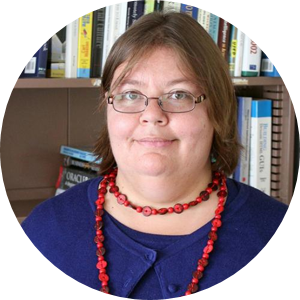
Jodi Schneider
Jodi is Assistant Professor of School of Information Sciences (iSchool), where she teaches classes in Information Organization and Access as well as in Information Modeling. She also affiliates with Infomatics; Beckman Institute; Health Care Engineering Systems Center; the European Union Center; and UIC Department of Psychiatry. Her research focus including: Linked data (ontologies, metadata, Semantic Web); argumentation and evidence; scholarly communication; knowledge organization; computer-supported cooperative work; biomedical informatics; science of science.
What do you see as the primary benefit to you of archiving your data in a repository AND what influenced your decision to deposit your data in the Illinois Data Bank?
Archiving data makes the processes used in our work very explicit. It also means nobody has to ask me: Can I have the data? Yes! It's already public.
I really appreciate the library's professional review: if Data Bank staff find the formats or organization of my data confusing, my colleagues would, too. On the other hand, my research focuses on the medical literature. Reproducibility is an increasing concern in medicine, and I feel it's my responsibility to make my own research as reproducible as possible.
I really appreciate the library's professional review: if Data Bank staff find the formats or organization of my data confusing, my colleagues would, too. On the other hand, my research focuses on the medical literature. Reproducibility is an increasing concern in medicine, and I feel it's my responsibility to make my own research as reproducible as possible.

Yuanxi Fu
Yuanxi Fu is a PhD student in Information Sciences at the University of Illinois at Urbana-Champaign. She holds a BS in chemistry from Nanjing University in China, a PhD in chemistry and a MS in bioinformatics from University of Illinois at Urbana-Champaign. Her research focuses on argumentation in science.
What do you see as the primary benefit to you of archiving your data in a repository? Is there anything else you would like to share about the Research Data Service, Illinois Data Bank, or your research?
The primary benefit is to share the data publicly that I used to produce my research. As a person also studies methods in science, I understand it is possible to reach different conclusions using different methods. Yet the underlying data are always the same. Sharing the data is a way of showing honesty about my research and leaving the door open for future examination.
Research Data Service staff brought to our attention several errors and inconsistencies in our data, although we have done checking several times and thought our dataset was water-tight. Having another pair of eyes always help!
Research Data Service staff brought to our attention several errors and inconsistencies in our data, although we have done checking several times and thought our dataset was water-tight. Having another pair of eyes always help!

Ryan Larsen
Ryan is a Research Scientist in the Department of Psychology. He has used MRI in a variety of experiments relating brain measurements to cognitive performance, cardiorespiratory fitness, body composition, and nutrition status. Ryan also develops new methods for the collection and analysis of MRI data.
What do you see as the primary benefit to you of archiving your data in a repository?
Depositing my data demonstrates my commitment to performing reproducible research. MRI datasets and analysis pipelines can be complicated; sharing the data and the processing scripts gives me peace of mind that the details of my work are preserved and can be built upon and improved after I have moved on to other things.
I have now deposited four data sets at the Illinois Data Bank. Each time the staff has thoroughly checked my data files and documentation for omissions or mistakes. They have always been knowledgeable, responsive, and helpful. Their participation gives me confidence that the dataset will be accurate and useful.
I have now deposited four data sets at the Illinois Data Bank. Each time the staff has thoroughly checked my data files and documentation for omissions or mistakes. They have always been knowledgeable, responsive, and helpful. Their participation gives me confidence that the dataset will be accurate and useful.

Jameson Mori
Jameson is an Assistant Research Scientist in the Wildlife Veterinary Epidemiology Lab at the Illinois Natural History Survey – Prairie Research Institute. They use statistics and modeling to better understand chronic wasting disease (CWD) in the wild white-tailed deer of Illinois and support management efforts.
What do you see as the primary benefit to you of archiving your data in a repository? What influenced your decision to deposit your data in the Illinois Data Bank?
Being able to archive my data in a repository allows me to make my data available to reviewers, readers, and collaborators in a way that is easy and stable. It also serves as an additional backup for my data should anything happen to my other means of saving files.
I chose to deposit my data in the Illinois Data Bank because all my research is conducted at the University of Illinois Urbana-Champaign and fits well with the goal of the Data Bank.

Carmen Ugarte
Carmen is a Research Specialist, Sustainable Agriculture and Soil Biology at NRES. Her research focuses on understanding the effects of soil management practices on soil quality and function. She is especially interested in studying the dynamics of soil food webs and their influence on soil ecosystem services such as nutrient cycling, carbon storage, and the regulation of population densities of deleterious soil organisms. Her work includes basic and applied research at different scales in the regional and national levels in agronomic and natural systems.
What do you see as the primary benefit to you of archiving your data in a repository? Is there anything else you would like to share?
As we strive to increase the transparency and reproducibility of our findings, data sharing is becoming the norm in the scientific community. By using the Illinois Data Bank to curate and safely archive my datasets, I am able to make my datasets publicly and readily available, and researchers can use it for multiple applications within the discipline.
The learning experience that one gets during the curation process enables researchers to build more comprehensive metadata structures and improved data management plans that may influence how we collect and share data in the future.
The learning experience that one gets during the curation process enables researchers to build more comprehensive metadata structures and improved data management plans that may influence how we collect and share data in the future.
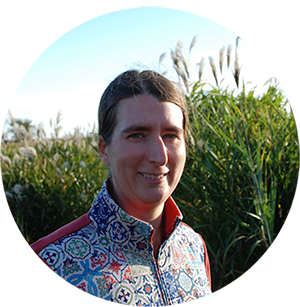
Lindsay Clark
I am a plant geneticist with particular interests in polyploidy, population genetics, and the development of novel algorithms and software for the analysis of molecular markers. I am currently a research specialist in the lab of Prof. Erik Sacks in the Department of Crop Sciences at the University of Illinois, Urbana-Champaign. I study genetic and phenotypic diversity of Miscanthus, a perennial grass used for bioenergy and biomass, and have made discoveries about its evolutionary history in the wild and in cultivation.
How did you decide that the Data Bank was the best place to put the data?
The Data Bank is free, and it allows any type of data, which is great. [...] We liked that we could put essentially any information in there that we wanted, including the original handwritten field notes. Having that in the same repository as the genetic data, the phenotypes, the R scripts for data analysis - the paper explains everything from field observations to how to sequence the DNA. We have a broad range of data types all in one repository, which is great. I also really like the ability to link to other datasets; the raw DNA sequence data is many gigabytes and that's stored in NCBI, but we can put a link from this dataset back to NCBI as well.

Zhiheng Lyu
Zhiheng is a postdoctoral fellow in Prof. Qian Chen’s group in the Department of Materials Science and Engineering. She received her Ph.D. in Chemistry at the Georgia Institute of Technology. Her current work is combining precision synthesis of nanocrystals with cutting-edge operando characterization to understand and develop advanced nanomaterials for energy applications.
What do you see as the primary benefit to you of archiving your data in a repository AND what influenced your decision to deposit your data in the Illinois Data Bank?
It is truly fantastic to have a convenient and cost-free platform for storing my data. With in situ electron microscopy, each experiment generates numerous images and corresponding analysis, which makes efficient data organization, storage, and transfer highly necessary. Illinois Dank Bank not only fulfills these needs, but also provides us with a professional and transparent way of data sharing with more researchers who are interested in our work or seeking to leverage our data for further innovation. Creating a knowledge-sharing environment is crucial to foster collaboration, inspire innovation, and verify data reliability. Furthermore, the staff here is also super responsive and professional, helping me improve my data description and make them more accessible to a wider audience.
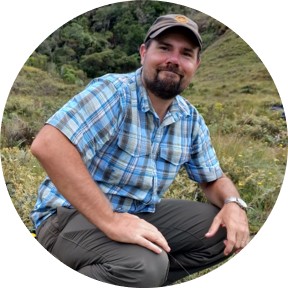
Devin Edmonds
Devin Edmonds is a doctoral candidate in the Department of Natural Resources and Environmental Sciences working in the Population and Community Ecology (PaCE) lab with Dr. Michael Dreslik. His research focuses on understanding the ecology of threatened species to inform conservation efforts. For his dissertation, he is studying the endangered Malagasy poison frog Mantella cowanii as part of a conservation action plan for the species.
What do you see as the primary benefit to you of archiving your data in a repository?
Depositing data in the Illinois Data Bank makes me feel like I didn't just do this research project for myself. These data are now in a public repository where they will be preserved and available for future use. Anybody can now learn from the data we have collected. It makes me feel good about the work I have done.

Jeffrey Kwang
Jeffrey Kwang is a graduate student studying fluvial geomorphology in the Department of Civil and Environmental Engineering under Professor Gary Parker. He studies how landscapes evolve over geologic time by using both physically-scaled and numerical models. His goal is to determine and understand the fundamental processes that are necessary to create the structure of landscapes and drainage networks that we see here on Earth.
What do you see as the primary benefit to you of archiving your data in a repository?
The Illinois Data Bank helped me organize and annotate my data sets so that researchers in and out of my field could use and understand my data. Many publications are now requiring researchers to upload their data to repositories and make their data easily accessible instead of writing, "Our data can be obtained by contacting the authors." However, just because the data is easily downloaded, does not mean that the data is useful. I uploaded my data to the Illinois Data Bank not just to fill a requirement but to make sure that my data was publicly available, annotated, and useful.

Bryan M. Reiley
A graduate student at the University of Illinois / Illinois Natural History Survey, Reiley is working on his PhD in the Department of Natural Resources and Environmental Sciences. His recent work found population declines of Swainson's warblers following catastrophic flooding events.
What influenced your decision to deposit your data in the Illinois Data Bank?
While I found many options available to store my data online, the cost was prohibitive for my tight graduate student budget and my project did not have funds to cover the cost of data storage. As I looked for more economical options I was surprised and happy to find that the U of I had an option that was free to students and faculty.